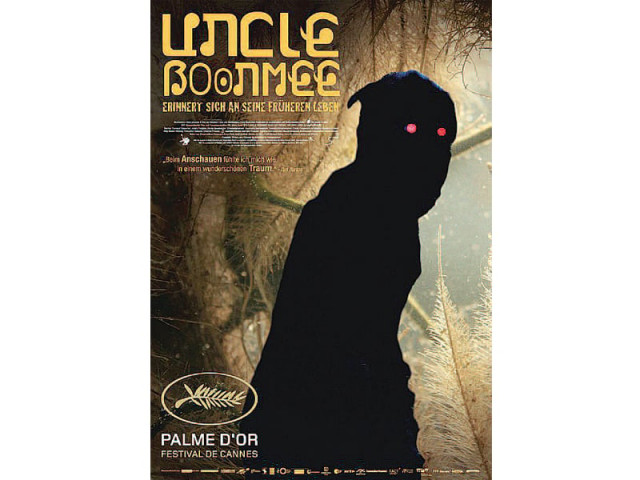Uncle Boonmee Who Can Recall His Past Lives: Nine lives
The film is a nostalgic exploration of the magical, mysterious and the miraculous.

In the movie, Boonmee (Thanapat Saisaymar) brings his sister-in-law Jen (Jenjira Pongpas) to his farm in rural Thailand, where he is preparing for his imminent death. He is suffering from kidney failure, and requires frequent dialysis. Boonmee has decided to leave everything to Jen. On the first night as they are having dinner, they are visited by the ghost of Boonmee’s wife Huay. Both Boonmee and Jen deal with this situation quite well. Tong (Sakda Kaewbuadee), the only young person on the table, is a bit freaked out. Soon, they are joined by Boonmee’s son, who died ages ago and has now turned into a kind of creature of the forest. The conversation that ensues is intense and sets the mood for the rest of the film.
From time to time we see flashbacks from Boonmee’s previous lives, but without the obvious flashes and colour treatment that dumbed-down Hollywood movies would throw in. The movie begins with one: a parable in which a restless buffalo breaks free, only to find that there is nowhere that it really wants to go. Death, karma, human relationships and spirituality are the major themes of this brilliantly made movie. Finally, it is time for Boonmee to go, and Huay’s ghost leads him to the place where his spirit was perhaps first born. Here he recalls what would be his last dream, one of the future. This in itself is fascinating because uptill now we have only dealt with the past, and now at the time of death, we see the only vision of the future. Weerasethakul has chosen to illustrate the narrative of this dream using pictures, some of which are quite comical. Boonmee says that in his dream the people of the future shine a light at ‘past people’ which projects images of them onto a screen, and this causes the ‘past people’ to disappear. This light that they shine must be the camera, for the television certainly has a large part to play in the death of spirituality.
Uncle Boonmee... is beautifully shot by Yukontom Mingmongkon and Sayombhu Mukdeeprom, and the way they have shown night-time in the lush Thai jungles deserves special mention. Often cinematographers use filters and cheat night scenes while actually shooting during day, which invariably looks fake. But here, it is most definitely night: blue and mysterious. To watch Uncle Boonmee... you’ll have to be calm, as it progresses rather slowly, and you will also have to embrace the fantastical. The glowing red eyes of the monkey-ghost can look ridiculous if watched through only ‘modern’ eyes. And it is such eyes who fail to see the spiritual world. The tragedy is that if you stop believing, it ceases to exist.
Published in The Express Tribune, Sunday Magazine, March 20th, 2011.



















COMMENTS
Comments are moderated and generally will be posted if they are on-topic and not abusive.
For more information, please see our Comments FAQ